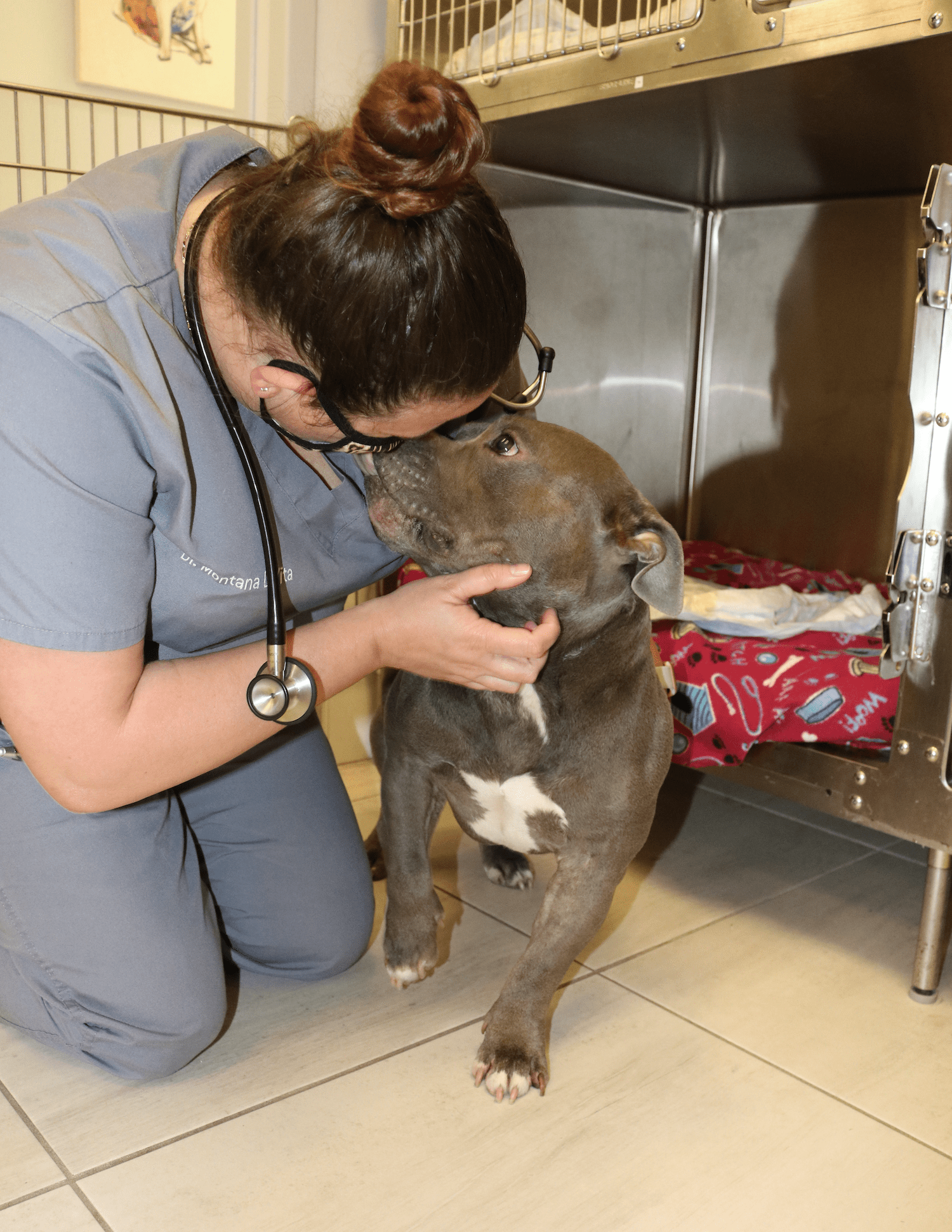When pain arises after some sort of traumatic event, it is easy to identify. However, neck pain often occurs in dogs without any obvious trauma. Therefore, signs of dog neck pain can be difficult to recognize, but it’s our job as pet parents to look for clues. Is your dog holding its head low or yelping when touched? Your poor pup may need to see a veterinary neurologist.

Signs of Neck Pain in Dogs
Promptly recognizing the following signs of neck pain can greatly affect your dog’s prognosis:
- Lowered head when standing
- Stiff neck or unable to turn head to side
- Neck muscle spasms
- Unwillingness to jump on/off furniture, go up/down stairs, or move
- Whining when moved or touched
- Spontaneous crying or yelping
- Walking slowly or carefully
- Reluctant to eat or drink from a bowl on the floor
Causes of Neck Pain in Dogs
There are several possible causes of dog neck pain, such as injury, infection, cancer, and a host of neurological diseases.
“Aside from a straightforward injury, neck pain in dogs is often caused by a neurological condition called cervical disc disease,” says Dr. Montana DiVita, Neurology Resident at Southeast Veterinary Neurology.

Cervical disc disease can be common in dogs as part of the aging process, but certain breeds are more prone to be affected earlier in life. Examples of predisposed breeds include:
- Dachshunds
- French Bulldogs
- Chihuahuas
- Beagles
Sadly, some of the breed traits that make our furry friends so lovable can also make these dogs more susceptible to neck pain.
What is Cervical Disc Disease in Dogs?
Cervical disc disease is intervertebral disc disease (IVDD) that only occurs in the neck (cervical spine) of a dog.
IVDD occurs when the once spongy, shock-absorbing discs between the bones of the spine dry out, harden, and rupture. You may have heard the condition in humans referred to as:
- Bulging disc
- Slipped disc
- Herniated disc
- Ruptured disc
The result is pressure on the spinal cord, causing an array of symptoms ranging from neck pain to permanent paralysis in dogs.
Symptoms of Cervical Disc Disease in Dogs
Clinical signs of cervical disc disease can range from mild to severe. Many dogs with cervical IVDD only show the signs of neck pain listed earlier. However, a variety of other clinical signs may develop.
In some cases, this condition can cause weakness in all four limbs, the holding up of a thoracic (front) limb, or in severe cases, inability to move the legs. In extreme cases of cervical IVDD near the shoulders, dogs may even have difficulty breathing.
A grading scheme of 1-5 is used to assess the severity of cervical disc disease symptoms:
- Grade 1: The dog is only experiencing neck pain. While there is variability in the severity of pain, there are no neurologic deficits, and the neurologic exam is normal.
- Grade 2: There is weakness in all four limbs, but the dog remains able to walk. When walking, the patient may appear drunk and wobbly, cross or splay its legs, or knuckle its paws under, but is able to walk.
- Grade 3: The dog is too weak to walk, but can still move its limbs.
- Grade 4: The dog is paralyzed, but still has feeling in its toes.
- Grade 5: The dog is paralyzed and CANNOT feel its toes.
“Although Grade 5 is the most severe stage, it is very uncommon with cervical IVDD and much more common with IVDD in the thoracolumbar spine (mid-back),” notes Dr. DiVita.
Treating Neck Pain in Dogs
Dogs can recover from cervical disc disease, but without timely treatment, it can progress quickly and cause irreversible spinal cord injury. The sooner dog neck pain is attended to, the better the prognosis.
“Depending on the severity of clinical signs and the treatment option elected, prognosis for recovery can be as high as 95%,” adds Dr. DiVita.
We strongly recommend visiting a veterinary neurologist as soon as possible to give your dog the best chance of recovery, as well as rule out several other neurological conditions that can look like cervical IVDD. Atlantoaxial (AA) instability, meningitis, discospondylitis, syringomyelia, wobbler syndrome, and tumors can all cause signs of neck pain in dogs, but have very different treatment protocols and prognoses.
Southeast Veterinary Neurology is open and neurologist staffed seven days a week to properly diagnose and expertly treat neck pain in dogs! Call one of our locations today for more information.
Posted in Cervical Disc Disease, IVDD
